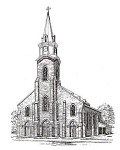The Holy Spirit’s Two Comings
User’s Guide to May 19, Pentecost
From: National Catholic Register
by Tom and April Hoopes, Register Correspondent
Saturday, May 18, 2013 11:21 PM
 May 19 is Pentecost Sunday.
May 19 is Pentecost Sunday.
Readings
Acts 2:1-11; Psalms 104:1, 24, 29-31, 34; 1 Corinthians 12:3-7, 12-13; John 20:19-23
Our Take
This is Pentecost Sunday, the day we celebrate the coming of the Holy Spirit and call an end to the Easter season. It is also the birthday of the Church.
There are two depictions of the coming of the Holy Spirit in today’s readings, and they are both very important. The one that came first is the one in the Gospel: Jesus breathes on the apostles and tells them, “Receive the Holy Spirit.” Then, later, at the end of their nine days of prayer after the Ascension, the Holy Spirit comes upon them in a dramatic way.
The first coming came after the Resurrection, in a private, intimate way: He breathed on them. The second came after his Ascension in a public way: He sent a mighty wind. The first gift of the Holy Spirit was reserved just for the apostles, who Jesus visited behind locked doors. Now, in the Upper Room, the Holy Spirit is given to Mary and them.
The signs are all there that this is a new creation; in the first case, the creation of the priesthood and ministerial function of the Church. In the second place, the creation of the Church.
The Catechism points out that the original creation was also accomplished through the Holy Spirit. “God fashioned man with his own hands [that is, the Son and the Holy Spirit] and impressed his own form on the flesh he had fashioned, in such a way that even what was visible might bear the Divine form,” says the Compendium of the Catechism (704). In the creation story, God then breathed his life into his creation.
Just as the Spirit created human beings as a soul-and-body unity in the image of God, he creates the Church as the body of Christ. “For in one Spirit we were all baptized into one body,” writes St. Paul in today’s second reading, “whether Jews or Greeks, slaves or free persons, and we were all given to drink of one Spirit.”
There are serious ramifications to our being the body of Christ.
First, consider Jesus giving his apostles the ability to forgive sins. This is huge: We know from earlier in Jesus’ story that forgiving sins is reserved to God alone. When Jesus healed the paralytic man who had been let down through a roof to reach him, he first forgave his sins. The learned scribes said: “Why does this man speak that way? He is blaspheming. Who but God alone can forgive sins?”
Who indeed? But now that God has become man and founded the Church, which is his body, this gift of forgiveness is shared with that first group who received the Spirit: the priests. When he gives them the Spirit, he says: “Whose sins you forgive are forgiven them, and whose sins you retain are retained.”
The scribes would have been surprised to hear that.
What about the second, public coming of the Holy Spirit?
The group’s reaction to the reception of the Holy Spirit is to immediately begin preaching about Christ. What is astonishing here is that they find that the language differences that once prevented them from speaking with other people have disappeared.
This is a work of the Holy Spirit that continues in our day. In the Christian message, we have a word of God that speaks to the hearts of men and women regardless of where they are from. The Catechism says we hear the Spirit:
— in the Scriptures he inspired;
— in the Tradition, to which the Church Fathers are always timely witnesses;
— in the Church’s magisterium, which he assists;
— in the sacramental liturgy, through its words and symbols, in which the Holy Spirit puts us into communion with Christ;
— in prayer, wherein he intercedes for us;
— in the charisms and ministries by which the Church is built up;
— in the signs of apostolic and missionary life; and
— in the witness of saints through whom he manifests his holiness and continues the work of salvation.
In this Year of the Faith, these are each ways we are called to help the Spirit’s renewal of the face of the earth.
Tom and April Hoopes write from Atchison, Kansas,
where Tom is writer in residence at Benedictine College.

